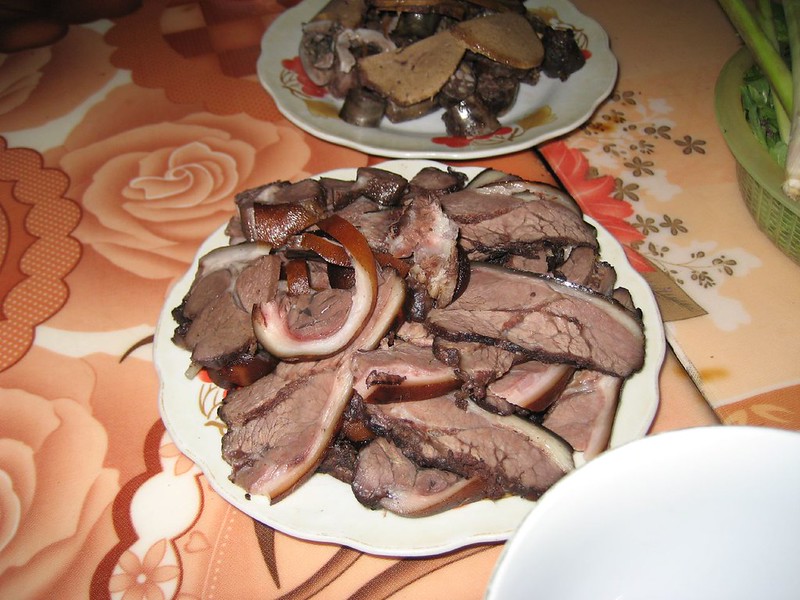In Indonesia, dog meat has never become mainstream, but this does not mean it is non-existent. The meat is often advertised as having healing properties; sellers would say the meat can cure serious diseases and increase virility. These bogus claims, silly it might sound, have attracted many. Dog-meat eaters believe that the warm feeling they feel after eating the meat is a proof of its healing abilities.
Dog meat is gathered from captured strays or kidnapped owned dogs. I’ve heard about “farmed dogs” but I’ve never encountered a dog farm. Legally, a dog farm wouldn’t be allowed. And if one wanted to run a dog farm disguised as a legal dog-breeding business, it would not be worth the cost. The price of a pet dog can range from few hundreds thousand to millions of rupiahs (due to the high cost of running this business). Meanwhile, a “meat-dog” is only valued at IDR 100,000 max. It is hence cheaper to take strays and steal people’s dogs.
Angelina from Animal Friends Jogja (AFJ), via BBC Indonesia, said that there are about 6,450 dogs slaughtered in Yogyakarta every month. In Surakarta, the number reached 12,840 per month. Other regions that have a high number of dog meat consumption are Jakarta and Bali.
In Java, by-the-street restaurants selling non-halal meat food usually open at night, partly to avoid offending the Muslim majority. This type of restaurant usually comes with a large banner stating what they sell. They would use certain terms, such as, B1 (dog meat) or B2 (pork), RW (dog meat), etc. If one is doubtful about what the seller cooks, they can ask and the seller is legally required to give them an honest answer. Selling non-halal meats is not illegal, but selling them as a halal food will send one to jail.
There are a few reasons why dog meat is not banned. First, people here don’t really differentiate between farmed and non-farmed animals. There’s no difference between dogs, cats, cows, and chickens. What makes a certain animal a “pet” is the amount of emotional closeness one has for it, not the type of animal it is. So one can have a pet chicken or a pet cow and have a neighbor who sees them as a food source. The same applies to dogs. The only thing that holds the majority back from eating dog meat is that most Indonesians are Muslims who see dogs as dirty and untouchable.
In college, I knew someone who owned a dog but loved to eat B1. When I asked her why she ate it, she said because it’s delicious — more delicious than pork. She didn’t think about her dog when she ate the dog meat as they’re two different dogs. One was her pet she was attached to, the other one was a foreign dog she didn’t care about.
Cultures and religions also contribute to how your views on consuming certain animals are shaped. This is why banning dog meat is difficult. As the person I mentioned above said: since her religion doesn’t ban dog meat, nobody should question her preference.
In some cultures in Indonesia, dog meat is served in a traditional dish. Saksang for instance, is a Bataknese ethnic dish that calls for dog meat (or pork) as the main ingredient. This food is considered a delicacy and is often served on special occasions. In Tomohon, Sulawesi, eating dogs is not off limits either.
The practice of eating dog meat was carried to Java by migrants and adventurous locals seem to have accepted the new culinary quite well. One might think that banning dog meat in the Muslim-majority region would be easy, but the truth is the opposite. A ban to this practice may be perceived as an intolerance. Hence dog-meat eating is not banned. It is allowed, but somewhat restricted.
Despite the (half-hearted) restrictions, dog-meat businesses seem to thrive. A dog-meat restaurant in Jakarta, for example, has been in business since the 1970s, which means they have regular customers, allowing them to remain in business for decades.
In Bali, things got a little bit interesting. Since the region’s economy relies heavily on tourism, things that might potentially upset tourists tend to be suppressed or hidden. You may not find a dog-meat restaurant as “easily” as you do in Java, but it’s very much present. ABC Australia reported that some tourists unknowingly bought and ate dog meat sold to them as chicken satay. According to BAWA, about 100,000 dogs are sold for consumption each year in Bali. The actual number may be higher as some meat is sold while it’s disguised as something else.
In 2015, a Surakarta lawmaker has proposed a plan to regulate dog-meat trade in the city, fearing the city would end up losing billions of rupiahs to fight rabies like Bali, but there hasn’t been any update since.
The governor of Central Java has ordered regents and mayors in the province to ban the sale and consumption of dog meat. He especially pushed Surakarta mayor to end the practice in the city, as it recorded the highest number of consumption. The mayor responded that he cannot force people to close down their businesses, but he promised to persuade them.
A stricter stance is taken by digital companies, such as Tokopedia (an online shop), Grab and GoJek (offering food delivery and ride-hailing services). They’ve vowed to remove exotic meats sold on their platforms.
Unless a total ban on dog-meat consumption is applied and enforced, the practice will never cease. The problem is that a strict ban is unlikely to happen, mainly due to the cultural and religious tolerance principle we Indonesians have to follow.
We may have to educate people about the risk of dog-meat consumption, with a particular focus on communities where dog meat is regularly consumed, to make sure that everybody understands.
Image credit: Greg Walters

